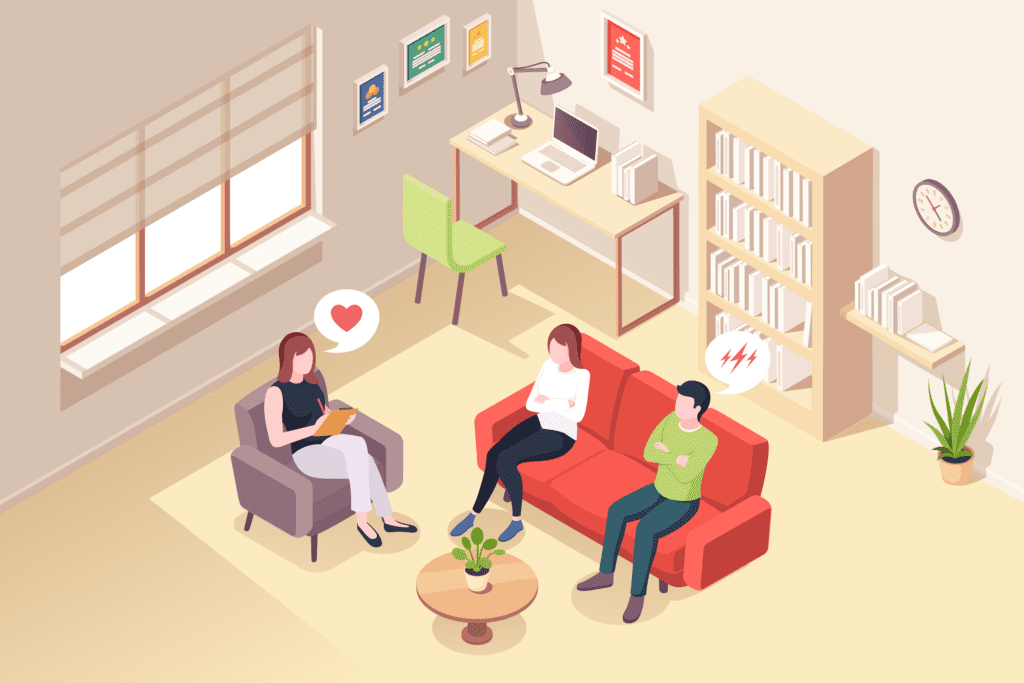Relationship problems can be challenging, and deciding whether to seek help through individual therapy or couples therapy can be confusing. Both options offer tools and insights, but which is the best choice for you? Let’s explore the benefits of each and how to choose the right path.
Individual Therapy: Focusing on Personal Growth
Benefits:
- Self-Reflection: Individual therapy allows you to explore your thoughts, feelings, and behaviours in a private setting. This can lead to deeper self-understanding and personal growth.
- Personal Issues: If you have personal issues affecting your relationship, such as past trauma, anxiety, or self-esteem problems, individual therapy can help you address these directly.
- Confidentiality: In individual therapy, you have the space to express yourself freely without worrying about your partner’s reactions or feelings.
- Empowerment: Working on yourself can empower you to bring positive changes into your relationship, fostering a healthier dynamic.
When to Choose Individual Therapy:
- You need to work on personal issues that impact your relationship.
- You want to understand your role in the relationship problems better.
- Your partner is unwilling or unable to attend therapy.

Couples Therapy: Solving Relationship Problems
Benefits:
- Communication Skills: Couples therapy focuses on improving communication between partners, helping you both express your needs and listen effectively.
- Conflict Resolution: A therapist can teach you strategies to resolve conflicts constructively and reduce misunderstandings.
- Mutual Understanding: Therapy provides a neutral space to explore each other’s perspectives, leading to greater empathy and connection.
- Shared Goals: Couples therapy helps you set and work towards shared goals, reinforcing your partnership.
When to Choose Couples Therapy:
- You and your partner both recognize the need for help and are willing to attend therapy together.
- The relationship problems are primarily relational, such as communication problems, trust issues, or frequent arguments.
- You want to strengthen your bond and work on the relationship collaboratively.
How to Choose the Right Path for Relationship Problems
1. Assess the Nature of the Problems:
- If the issues are primarily personal, such as individual stress or mental health concerns, individual therapy might be more appropriate.
- If the problems are centred around the dynamics of the relationship, couples therapy could be the better option.
2. Consider Your Partner’s Willingness:
- If your partner is open to attending therapy together, couples therapy can be highly beneficial.
- If your partner is reluctant, starting with individual therapy may be the best step.
3. Seek Professional Guidance:
- Consult with a therapist to discuss your situation. They can provide insights and recommendations on whether individual or couples therapy is more suitable for your needs.
4. Be Open to Both:
- Sometimes, a combination of individual and couples therapy is the most effective approach. Working on yourself while also addressing relationship issues together can provide comprehensive support.
Conclusion
Deciding between individual therapy and couples therapy depends on the nature of your relationship problems and your personal needs. Individual therapy offers a space for personal growth and self-reflection, while couples therapy focuses on improving partner dynamics. By assessing your situation and seeking professional advice, you can choose the path that best supports your journey towards a healthier, more fulfilling relationship.
Ready to begin? Start your online therapy journey today. Book your first session now.




